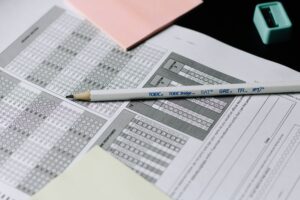
Photo by Nguyen Dang Hoang Nhu on Unsplash
By Ben Lovely
“You want us to do what?!”
I’m sure in March 2020, Trades and Technology was not the only school having emergency meetings regarding a mandatory shift to remote delivery. With much collective effort, TRU made the pivot to digital in record time. Below I’d like to discuss some lessons I’ve learned regarding assessment in an online world. These suggestions have worked well in Trades, but are certainly not limited to Trades courses.
The traditional go to assessment for Trades—multiple choice—has turned out to be rather ineffective in an online environment. In an effort to maintain academic integrity, faculty have attempted short timelines, creating multiple versions of tests, and using exam proctoring software. These have had the effect of causing extreme stress for students, large workload for faculty, and additional costs. In the end, it is still very possible for resourceful students to cheat multiple choice exams.
I propose the following: multiple choice, alternate response, and short answer questions should be limited to low stakes formative assessment. Due to our certification exams being multiple choice, students definitely need practice with this style of exam. I am merely suggesting that we reduce their weighting in favor of better assessment methods.
High stakes summative assessments, such as unit and level exams, should be as authentic as possible. Projects, scenarios, simulators, labs, and case studies are best. If assessing math skills, I like to assign the right answer as 50% of the mark, and the other 50% towards showing all work and the process of solving the problem. For conceptual understanding, a detailed directed paraphrasing assignment can work well. In short, I try to assess students’ learning by asking them to show me how they use that knowledge.
Benefits to this approach include potentially easier grading, difficulty in plagiarizing, and less concern over exam integrity as the assignment is assumed to be open book. Without a doubt, it is more work to create authentic assessments and their associated rubrics for grading. However, once completed, you will have an assessment that can be given many times over which will more accurately reflect student learning.

Leave a Reply